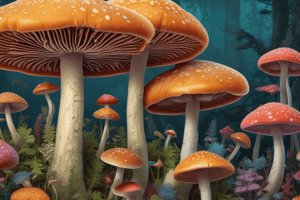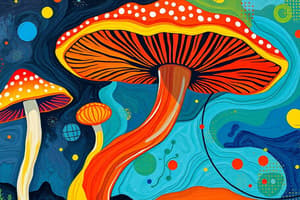Podcast
Questions and Answers
What does the smell of matsutake represent?
What does the smell of matsutake represent?
Memory and history
Humans breathe and smell in the same intake of air.
Humans breathe and smell in the same intake of air.
True (A)
What did the author do after cooking matsutake for the first time?
What did the author do after cooking matsutake for the first time?
- Threw the pan away (correct)
- Enjoyed the dish
- Gave them to friends
- Ate them with vegetables
The smell of matsutake is symbolic of __________.
The smell of matsutake is symbolic of __________.
Smell is easy to describe in words.
Smell is easy to describe in words.
What is the focus of 'The Mushroom at the End of the World'?
What is the focus of 'The Mushroom at the End of the World'?
What is matsutake?
What is matsutake?
Matsutake mushrooms emerged only in pristine natural environments.
Matsutake mushrooms emerged only in pristine natural environments.
What historical event is associated with the first emergence of matsutake mushrooms?
What historical event is associated with the first emergence of matsutake mushrooms?
What was the impact of modernization on jobs in relation to matsutake foragers?
What was the impact of modernization on jobs in relation to matsutake foragers?
The first recorded mention of matsutake in Japan was in an eighth-century _____ poem.
The first recorded mention of matsutake in Japan was in an eighth-century _____ poem.
How did the wild mushroom trade begin?
How did the wild mushroom trade begin?
What does the term 'Anthropocene' refer to?
What does the term 'Anthropocene' refer to?
Precarity is viewed as an exception to how the world works.
Precarity is viewed as an exception to how the world works.
What is required for survival according to the book?
What is required for survival according to the book?
How did the Mien people's identity change over time?
How did the Mien people's identity change over time?
Flashcards are hidden until you start studying
Study Notes
Overview of "The Mushroom at the End of the World"
- Investigates the connection between capitalist destruction and collaborative survival in multispecies ecosystems.
- Examines the matsutake mushroom as a lens to understand precarious livelihoods and environments amidst ecological changes.
- Emphasizes the need to expand our imagination to address contemporary unpredictability.
Matsutake Mushroom
- Most valuable and sought-after mushroom globally, thriving in disturbed forests of the northern hemisphere.
- Considered a delicacy in Japan, often fetching exorbitant prices.
- Plays a role in forest regeneration by nurturing trees, showcasing resilience in damaged landscapes.
- Linked to cultural practices and idealized seasonal aesthetics in Japanese poetry and arts.
Historical Context of Hiroshima
- The first living organism to emerge from Hiroshima's devastation was a matsutake mushroom.
- Symbolizes human capacity to disrupt ecological balance and highlights the impact of modernization on job security and livelihoods.
- Explores the irony of reliance on capitalism despite the prevalence of precarious jobs and environmental degradation.
Commerce and Ecologies Surrounding Matsutake
- Tracks how matsutake trade reflects both precarious work conditions and capitalist exploitation.
- Foragers are often displaced individuals without job security or benefits, relying on a volatile mushroom economy.
- Connects historical human disruptions with the emergence of matsutake in Japan.
Modernization and Matsutake's Decline
- The Meiji Restoration led to deforestation and a decline in matsutake populations from the early to mid-20th century.
- Increased demand during Japan’s economic growth contrasted with the rarity of matsutake due to habitat loss.
- Globalization introduced international matsutake trade, with varying pricing based on geographic origin reflecting social hierarchies.
Emergence of Wild Mushroom Trade
- The wild mushroom trade initiated in Oregon's forests post-Chernobyl disaster created a rush for matsutake.
- Highlighted the complex dynamics between environmental conservation efforts and economic opportunities for marginalized communities.
- The emergence of foraging as a livelihood is linked to both environmental exploitation and job scarcity.
Anthropocene and Capitalism
- The term Anthropocene used to describe human-induced ecological changes versus natural evolution.
- Suggests the roots of ecological devastation are deeply intertwined with the rise of capitalism, reflecting ongoing exploitation of natural resources.
- Challenges traditional notions of progress and encourages a reconsideration of survival through collaboration and recognition of interconnectedness.
Precarity as a Condition of Our Time
- Precarity seen as a common state rather than an exception, challenging modern assumptions of stability and progress.
- Highlights the importance of collaborations across species for survival and adaptability in changing environments.
- Advocates for practical activities that empower diverse livelihoods beyond conventional capitalist frameworks.
Assemblage Theory in Ecology
- Assemblages defined as open-ended gatherings that reflect diverse interactions among species and environments.
- Encourages a rethinking of ecological histories and community structures outside of linear progressivism.
- Suggests contemporary survival requires understanding and navigating complexities of relationships among species.
The Role of Contamination in Collaboration
- Contamination illustrates how interactions with others shape our identities and worldviews.
- Emphasizes the necessity of collaborations across differences for successful coexistence.
- Highlights how historical narratives of collaboration are often marred by legacies of exploitation and diversity.
Mien and Hmong Communities
- Mien and Hmong communities represent examples of adaptability and complexity in identity, influencing matsutake foraging practices.
- Their histories reflect broader themes of migration, state relationships, and labor dynamics in the mushroom industry.
- Recognition of ethnic transformation helps understand the nuanced experiences of foragers in contemporary contexts.
The Significance of Smell
- Smell serves as a potent symbol of memory and cultural connection, particularly in relation to matsutake.
- Reflects deeper socio-cultural narratives and evokes emotional responses tied to personal history and community.
- The complexity of olfactory experiences underscores the intertwined nature of species and human interactions in shaping ecological realities.
Studying That Suits You
Use AI to generate personalized quizzes and flashcards to suit your learning preferences.




